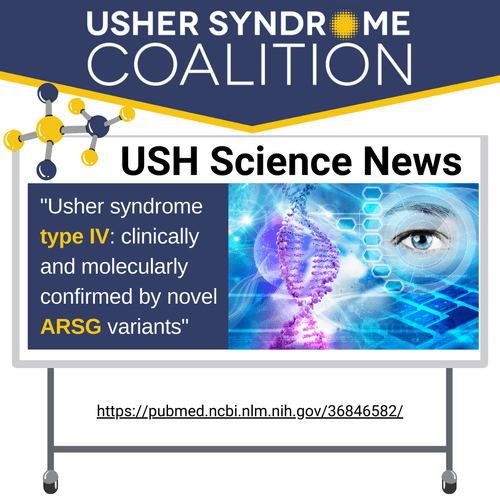Grounded in Science
A balance of research news and well-being for the Usher syndrome community.
There are 37 days until Usher Syndrome Awareness Day! If you haven’t already, please reach out to your governor to secure a proclamation for this day. There will also be a few USH Local Socials taking place on or near that day, September 16th- check out some locations here.
Where in the world is USH?
Let's show where our #USHFamily is for this global Usher Syndrome Awareness Day! Send us a short video following the example in this video to be featured in a reel shared on Usher Syndrome Awareness Day, September 16, 2023! Videos must be received by September 12th to be included. Send to @UsherCoalition via Direct Messenger on Instagram or Facebook.
If you haven’t signed in to your account in the Usher Syndrome Data Collection Program (USH DCP) lately, now is the time to do so! Be sure to upload your genetic reports, and fill in the surveys as they appear on your portal. We will start compiling some of the data to share in September.
Have you joined the Usher Syndrome Coalition Discord Community Server? It’s a safe place for the community to connect with each other. Join here: https://discord.gg/czwHGaDu7W
Research Spotlight
ProQR Agreement with Laboratoires Théa for Sepofarsen and Ultevursen Inherited Retinal Disease Programs
As you may recall, in August 2022, ProQR announced that they would be winding down the Sirius clinical trial while they looked to "identify a strategic partner to take the ophthalmology portfolio forward." That strategic partner has been found!
ProQR has announced Laboratoires Théa (Théa) will continue the development of the ultevursen (USH2A, Exon 13) and sepofarsen (Leber congenital amaurosis 10) clinical trials. Within Théa, a fully dedicated team specializing in inherited retinal disorders and a new organization are currently being set up to manage these two projects.
Throughout the transition period, Théa is setting up a team entirely dedicated to developing these products. Clinical trials may be expected to resume in 2024, once the organization has been fully set up. Future details will be communicated by the new team after September 2023. Learn more.
For more, check out our Current USH Research page specific to USH subtype as well as gene-independent therapeutic approaches.
In Case You Missed It: Science News Feature
Usher syndrome type IV: Clinically and molecularly confirmed by novel ARSG variants
Previously, three types of Usher syndrome (USH), were defined based on the age of onset and severity of the clinical symptoms. The three types (USH1, USH2, USH3) are further sub-typed by genetic testing, which is indicated by a letter after the number. Typically, the symptom presentation and progression is similar within each type. Atypical USH occurs when mutations are found in one of the genes known to cause a subtype, but the symptom presentation is different than what is typical for that type.
Mutations in the arylsulfatase G (ARSG) gene have been implicated to cause a fourth type of USH (USH4) with a distinct set of symptoms that includes the late onset of both hearing impairment and retinitis pigmentosa (RP), with no vestibular involvement. Unlike types USH1-3, in which the RP is mostly located in the outer or peripheral region of the retina, causing tunnel-vision, the RP in USH4 is predominantly located in the pericentral and macular regions of the retina and affects central vision (Khateb et al 2018, Abad-Morales et al 2020, Peter et al 2020, Fowler et al 2021, Igelman 2021 et al 2021). Most recently, researchers at Radboud University Medical Center in the Netherlands confirm these clinical findings in additional, unrelated individuals.
What this means for Usher syndrome: This recently-described distinct type of Usher syndrome expands the field of knowledge, which is important for improving the diagnosis and management of the symptoms and vital to developing a treatment and/or cure for this still little-understood disease.
DISCLAIMER: The Usher Syndrome Coalition does not provide medical advice nor promote treatment methods. USH Science News is intended to help summarize more complex literature for the community to use at their own discretion.
For more science news, check out our Science News page, organized by treatment approach and type of Usher syndrome.
On Well-Being: Anticipatory Grief
Anticipatory grief is defined as a state of deep, painful sorrow that can occur before an impending loss, such as being diagnosed with a progressive condition like Usher syndrome...
USH Life Hack of the Month
(Send your USH life hacks to info@usher-syndrome.org.)
“We do not have carpeted stairs, so I added individual carpet pads to each stair step inside my house. This hack lets my feet know when I’ve arrived at the top or bottom of the stairs when I no longer feel carpet.”








